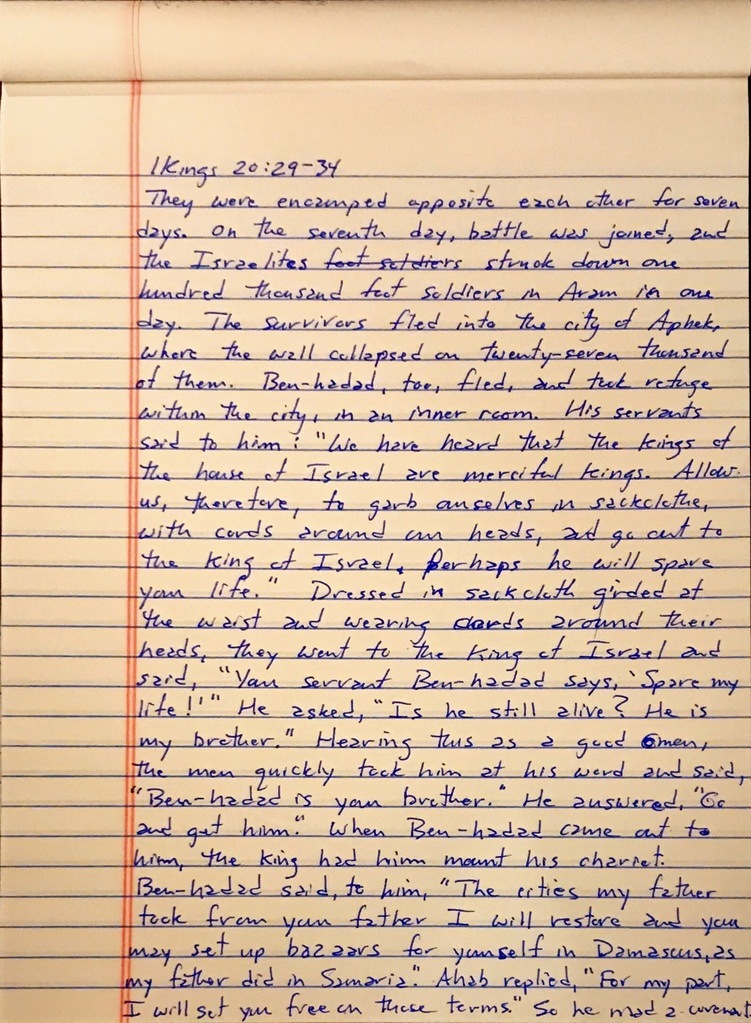
Ben-hadad’s Relief

Synopsis 1Kings 20:29-34 6/24/2019
Ben-hadad’s army camped near Aphek, east of the Jordan. And so, King Ahab positioned his forces opposite. The forces remained stationary for seven days before the battle began.
Once again, the Israelites inflicted an overwhelming defeat. So, the Aramite soldiers, including King Beh-hadad, retreated into the town of Aphek. There, they experienced a second defeat in the city as the wall collapsed. However, Ben-hadad hid in an inner room inside the city with the help of his servants.
Eventually, his servants changed into clothes made from sackcloth. Then, they came out from hiding and approached King Ahab. When they found him, they begged for Ben-hadad’s life to be spared.
Ahab had mercy on Ben-hadad. He allowed him to ride in his chariot. In the end, Ben-hadad returned some cities previously taken from Israel. And he gave Ahab the opportunity to conduct commerce in Damascus. In exchange, Ahab restored Ben-hadad and set him free.
Ben-hadad’s Relief
King Ben-hadad was a deeply evil man. Hundreds of thousands of people died miserable deaths because of the decisions that he made. And in defeat, he realized that as the leader of a vanquished army, the best he could justly hope for was a mercifully quick death.
Despite this, Ahab offered him mercy. In response, Ben-hadad gladly offered restitution.
Relief and Restitution
There is something about the experience of being saved that usually provokes a response of generosity.
When I’ve done something that I know is wrong, even if I can rationally justify my behavior, the weight of my sin remains with me. Of course, it’s sometimes possible for me to suppress my feelings of guilt and shame. Even so, I remain affected. These feelings lurk around in my mind. And then they unexpectedly show up in the strangest moments. Sometimes they arise in a dream. Or sometimes in an unusual encounter that reminds me of the circumstances of my own guilt. And then I suddenly become, once again aware of my shame.
As human beings, we’re constantly making comparisons. And regardless of the objects that we’re encountering in a particular moment, the fundamental comparison is always a question of “What Is” compared to “What Should Be”. And the consequence of this comparing is that I move towards obtaining “What Should Be”.
But when I’ve done something unjust, the psychology doesn’t change. The “What Should Be”, is me getting my just deserts. So, a tension forms because I really don’t want “What Should Be”. When I’m the offender, I don’t really want justice.
This is why the experience of salvation is so unique. In the moment when I feel saved, something changes. I experience a rapid reversal. And here, I’m not just talking about eternal salvation. But even the experience of being saved from embarrassment or from physical injury. Any experience of salvation brings an extraordinary sense of relief.
And the reason for relief is in the comparison. In that moment, the difference between what is and what should be is extinguished. The “what is” of salvation is so much better than the “what should be” of just punishment or exposure, that I feel more than satisfied. For, I have received more than I deserve – more than I could expect.
And in this moment of satisfaction, I no longer feel the need to cling to the thing that caused me to act unjustly in the first place. And so, I can let it go. Suddenly, I experience the freedom to stop clinging. And then, I am free to give it back. Like Beh-hadad; I am free to gladly offer restitution.
So then, this freedom to generously give is an evidence of salvation. And not just the salvation offered, but the salvation actually entered into.
This is the freedom made actual through Christ crucified and risen.
“But Zacchaeus stood there and said to the Lord, “Behold, half of my possessions, Lord, I shall give to the poor, and if I have extorted anything from anyone I shall repay it four times over.” Luke 19:8

